UC Berkeley Undergraduate Research Symposium
Saturday, February 24, 2024 | 9 AM – 1 PM
David Brower Center, Tamalpais Room, Berkeley CA
The College of Letters & Science invites you to the inaugural UC Berkeley Undergraduate Research Symposium! The symposium features a series of 8-minute presentations by undergraduate researchers, and a panel about how to get started in research at Berkeley. It’s a unique opportunity to discover the breadth of undergraduate research and creative projects across campus; learn about programs that support undergraduate research on campus; and get inspired to get involved in research.
This event is intended for current undergraduate students at UC Berkeley. Registration is required, and free and open to all current students, faculty, and staff at UC Berkeley.
This event will take place at the Tamalpais Room at the David Brower Center in downtown Berkeley. Breakfast and lunch will be served to registered attendees. We kindly request that you only register for the event if you can attend, as the capacity of the venue is limited.
Schedule
Live CART captions will be available during the event: https://www.streamtext.net/player?event=UCBDAC
Check-In and Breakfast (8:30–9:00 AM)
Breakfast for registered attendees.
Welcome Remarks (9:00–9:15 AM)
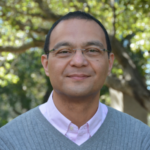 Rodolfo Mendoza-Denton (he/they) is professor of psychology and Associate Dean of L&S at the University of California, Berkeley. Childhood experiences living in Mexico, the U.S., Ivory Coast, and Thailand cemented an early interest in cultural differences and intergroup relations. He received his BA from Yale University and his PhD from Columbia University. Mendoza-Denton’s professional work covers stereotyping and prejudice from the perspective of both target and perceiver, intergroup relations, as well as how these processes influence educational outcomes. He is the recipient of the UC Berkeley Chancellor’s Award for Advancing Institutional Excellence, the University-wide Distinguished Teaching Award, as well as the Richard and Rhoda Goldman Distinguished Professorship in the Social Sciences. He was elected into the American Association for the Advancement of Science in 2022.
Rodolfo Mendoza-Denton (he/they) is professor of psychology and Associate Dean of L&S at the University of California, Berkeley. Childhood experiences living in Mexico, the U.S., Ivory Coast, and Thailand cemented an early interest in cultural differences and intergroup relations. He received his BA from Yale University and his PhD from Columbia University. Mendoza-Denton’s professional work covers stereotyping and prejudice from the perspective of both target and perceiver, intergroup relations, as well as how these processes influence educational outcomes. He is the recipient of the UC Berkeley Chancellor’s Award for Advancing Institutional Excellence, the University-wide Distinguished Teaching Award, as well as the Richard and Rhoda Goldman Distinguished Professorship in the Social Sciences. He was elected into the American Association for the Advancement of Science in 2022.
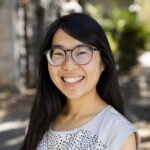 Aileen Liu (she/her) is the Director of Curricular Engagement Initiatives in L&S. In this role, she oversees several campus-wide undergraduate programs, including On the Same Page, Big Ideas Courses, L&S Discovery Courses, Freshman and Sophomore Seminars, and L&S 1. She earned her BA in English from Duke University, and her PhD in English with a Designated Emphasis in Renaissance and Early Modern Studies from UC Berkeley.
Aileen Liu (she/her) is the Director of Curricular Engagement Initiatives in L&S. In this role, she oversees several campus-wide undergraduate programs, including On the Same Page, Big Ideas Courses, L&S Discovery Courses, Freshman and Sophomore Seminars, and L&S 1. She earned her BA in English from Duke University, and her PhD in English with a Designated Emphasis in Renaissance and Early Modern Studies from UC Berkeley.
Student Panel: Molecular & Cell Biology, Political Economy, Data Science, Journalism, Geology (9:15–9:45 AM)
“A Cysteine-Reactive Compound Screen to Identify Novel Regulators of Foxp3 Expression”
Ameneh Gharabi (she/her), Molecular and Cell Biology major, Class of 2024, Transfer Admit
Research Mentors: Dr. Michel DuPage, Professor of Immunology and Pathogenesis; and Dr. Janneke Peeters
Program: Haas Scholars Program
“Mapping the Paths to Resistance: Geographic Analysis of Jewish Underground Activities in Algiers during World War II”
Hanh Chu (she/her), Political Economy and Data Science majors, Journalism minor, Class of 2024, First-Year Admit
Research Mentor: Dr. Robert Braun, Professor of Sociology
Program: Institute of International Studies Undergraduate Fellows
“Magma Storage Depths Beneath the Largest Volcano on Earth”
Berenise Rangel (she/her), Geology major, Class of 2024, First-Year Admit
Research Mentor: Dr. Penny Wieser, Professor of Earth and Planetary Science
Programs: MPS Scholars, Summer Undergraduate Research Fellowship (SURF), Charles H. Ramsden Endowed Fellowship
Break (9:45–10:00 AM)
You are encouraged to introduce yourself to the panelists and ask questions one-on-one during this time.
Student Panel: Cognitive Science, Data Science, Geography, Political Science, Sociology (10:00-10:30 AM)
“Using Network-Based Neurostimulation for the Treatment of Chronic Pain”
Kriti Achyutuni, Cognitive Science major and Data Science minor, Class of 2024, First-Year Admit
Research Mentors: Dr. Mark D’Esposito, Professor of Psychology; and Dr. Julian Motzkin, UCSF
Program: Summer Undergraduate Research Fellowship (SURF)
“Pico-Robertson: How external constraints, ethnic economies, and resource extraction created a dense Jewish enclave”
Tohar Zamir (he/him), Geography and Political Science majors, Class of 2024, First-Year Admit
Research Mentor: Jovan Scott Lewis
Programs: Haas Scholars Program, Undergraduate Research Apprenticeship Program (URAP)
“Understanding the relationship between domestic violence organizations and alternative schools”
Elizabeth Brown (she/her), Sociology major, Class of 2024, Transfer Admit
Research Mentors: Dr. Laleh Behbehanian, Professor of Sociology; and Dr. Jeffrey Edleson, Emeritus Dean of Social Welfare and Professor of the Graduate School
Programs: NAVCAL, Firebaugh Scholars Program, and the Underground Scholars Research Cohort
Break (10:30–10:45 AM)
You are encouraged to introduce yourself to the panelists and ask questions one-on-one during this time.
Student Panel: Geography, Physics, Music, Molecular & Cellular Biology (10:45–11:15 AM)
“Revitalizing Cultural Fire in 21st Century California”
Annabelle Law (she/her), Geography major, Class of 2024, Transfer Admit
Research Mentor: Dr. Clancy Wilmott, Professor of Geography
Program: Undergraduate Research Apprenticeship Program (URAP)
“Modeling Stylus Dynamics using High-Speed Photography”
Max King (he/him), Physics and Music majors, Class of 2024, First-Year Admit
Research Mentors: Dr. Carl Haber and Earl Cornell
Programs: MPS Scholars, Summer Undergraduate Research Fellowship (SURF), Undergraduate Research Apprenticeship Program (URAP)
“Beta 2 Microglobulin (B2M) Knockout Using CRISPR Engineering”
Maya Singh (she/her), Molecular and Cellular Biology with an emphasis in Immunology and Molecular Medicine, Class of 2025, First-Year Admit
Research Mentors: Dr. Sibapriya Chaudhuri and Dr. James Lee (PI)
Programs: Biology Scholars Program, Undergraduate Research Apprenticeship Program (URAP)
Break (11:15–11:30 AM)
You are encouraged to introduce yourself to the panelists and ask questions one-on-one during this time.
Panel: How to Get Involved in Undergraduate Research at Berkeley (11:30 AM–12:00 PM)
Join us for a lively conversation with Alessandra Lanzara, Jessica Stevenson Stewart, and Joni Landeros-Cisneros about how to get involved in undergraduate research at Berkeley. Panelists will share resources for finding, developing, and funding research projects, including the Discovery Opportunities Database. Moderated by Aileen Liu.
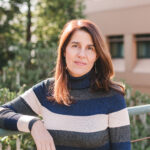 Alessandra Lanzara (she/her) is the Charles Kittel Professor of Physics at UC Berkeley and Director of the Berkeley Discovery Hub. Alessandra is an internationally recognized physicist, studying the science and technology of quantum materials, materials where quantum phenomena cause unique and unexpected behaviors, making them ideal for the technologies of the future. Through development and application of advanced scientific tools, coherent optical laser drives, and artificial intelligence, her laboratory is at the forefront of materials science and condensed matter research. She also holds an appointment with the Kavli Energy Nanoscience Institute, and she is both a Senior Faculty Scientist at the Lawrence Berkeley National Laboratory and a Gordon and Betty Moore Investigator. Alessandra received her PhD in physics from Universita’ di Roma La Sapienza, Italy and was a postdoc at Stanford University from 2000-2002. She joined the physics department faculty at UC Berkeley in 2002 and was promoted full professor in 2011.
Alessandra Lanzara (she/her) is the Charles Kittel Professor of Physics at UC Berkeley and Director of the Berkeley Discovery Hub. Alessandra is an internationally recognized physicist, studying the science and technology of quantum materials, materials where quantum phenomena cause unique and unexpected behaviors, making them ideal for the technologies of the future. Through development and application of advanced scientific tools, coherent optical laser drives, and artificial intelligence, her laboratory is at the forefront of materials science and condensed matter research. She also holds an appointment with the Kavli Energy Nanoscience Institute, and she is both a Senior Faculty Scientist at the Lawrence Berkeley National Laboratory and a Gordon and Betty Moore Investigator. Alessandra received her PhD in physics from Universita’ di Roma La Sapienza, Italy and was a postdoc at Stanford University from 2000-2002. She joined the physics department faculty at UC Berkeley in 2002 and was promoted full professor in 2011.
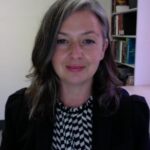 Jessica Stevenson Stewart (she/her) is the Director of the Office of Undergraduate Research and Scholarships (OURS). A former Haas Scholar, she received both her BA and PhD from the History of Art Department at UC Berkeley. Jessica specializes in the intellectual cultures of collecting in sixteenth-century Northern Europe. Her research, often focusing on the visual culture of international trade in the early modern world, has been supported by fellowships from the Center for the Advanced Studies in the Visual Arts (CASVA), the Kress Foundation, the Fulbright Administration, and the Belgian American Educational Foundation (BAEF). An advocate for interdisciplinary research as well as project- and object-based inquiry, Jessica has taught extensively from museum collections, first as a Kress Fellow for the Fine Arts Museum of San Francisco and subsequently as the Associate Curator for Academic Engagement at Stanford University’s Cantor Arts Center. She is currently working on articles on German mining and the invention of landscapes, on knowledge formation in Splendor Solis, an alchemical manuscript, and on the emergence of global art markets in the Netherlands.
Jessica Stevenson Stewart (she/her) is the Director of the Office of Undergraduate Research and Scholarships (OURS). A former Haas Scholar, she received both her BA and PhD from the History of Art Department at UC Berkeley. Jessica specializes in the intellectual cultures of collecting in sixteenth-century Northern Europe. Her research, often focusing on the visual culture of international trade in the early modern world, has been supported by fellowships from the Center for the Advanced Studies in the Visual Arts (CASVA), the Kress Foundation, the Fulbright Administration, and the Belgian American Educational Foundation (BAEF). An advocate for interdisciplinary research as well as project- and object-based inquiry, Jessica has taught extensively from museum collections, first as a Kress Fellow for the Fine Arts Museum of San Francisco and subsequently as the Associate Curator for Academic Engagement at Stanford University’s Cantor Arts Center. She is currently working on articles on German mining and the invention of landscapes, on knowledge formation in Splendor Solis, an alchemical manuscript, and on the emergence of global art markets in the Netherlands.
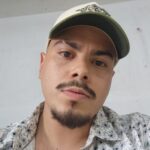 Joni Landeros-Cisneros (he/him/his) is a first-generation scholar in the Critical Studies of Race, Class, and Gender in the Ph.D. program in the Education department. He was born in La Piedad, Michoacán, and was raised in Sioux City, Iowa. He completed a B.S. in anthropology and an MA in anthropology from Iowa State University where he was a Ronald E. McNair scholar. His research interests include whiteness studies, asymmetrical and targeted policing in K-12 and higher education, abolition studies, and the prison-industrial complex (school-prison-industrialized labor nexus). He has research experience in biological anthropology, cultural anthropology, and linguistic anthropology. For his doctoral studies, he is inquiring how police humanitarianism, a domestic counterinsurgency program, is upheld and reproduced for mental health and drug education initiatives in educational institutions. Being a target of asymmetrical criminalization has provided him an entry to imagine alternative solutions beyond educational reform and disrupt the hyper-criminalization of ethno-racially marginalized communities. His commitment to undoing these systems and destabilizing power relations is evidenced by his commitment to mentorship and his pursuit of a Ph.D. in education with a focus on critical studies. He intends to join the professoriate and dedicate his work to transformational research that has the power to reshape and make higher education accessible to historically marginalized students while disrupting the mechanisms that uphold targeted criminalization. In his free time, he enjoys road cycling, fútbol, hiking, hanging with friends, listening to corridos and banda, and watching competitive cooking tv shows.
Joni Landeros-Cisneros (he/him/his) is a first-generation scholar in the Critical Studies of Race, Class, and Gender in the Ph.D. program in the Education department. He was born in La Piedad, Michoacán, and was raised in Sioux City, Iowa. He completed a B.S. in anthropology and an MA in anthropology from Iowa State University where he was a Ronald E. McNair scholar. His research interests include whiteness studies, asymmetrical and targeted policing in K-12 and higher education, abolition studies, and the prison-industrial complex (school-prison-industrialized labor nexus). He has research experience in biological anthropology, cultural anthropology, and linguistic anthropology. For his doctoral studies, he is inquiring how police humanitarianism, a domestic counterinsurgency program, is upheld and reproduced for mental health and drug education initiatives in educational institutions. Being a target of asymmetrical criminalization has provided him an entry to imagine alternative solutions beyond educational reform and disrupt the hyper-criminalization of ethno-racially marginalized communities. His commitment to undoing these systems and destabilizing power relations is evidenced by his commitment to mentorship and his pursuit of a Ph.D. in education with a focus on critical studies. He intends to join the professoriate and dedicate his work to transformational research that has the power to reshape and make higher education accessible to historically marginalized students while disrupting the mechanisms that uphold targeted criminalization. In his free time, he enjoys road cycling, fútbol, hiking, hanging with friends, listening to corridos and banda, and watching competitive cooking tv shows.
Lunch and Networking (12:00–1:00 PM)
Lunch for registered attendees.
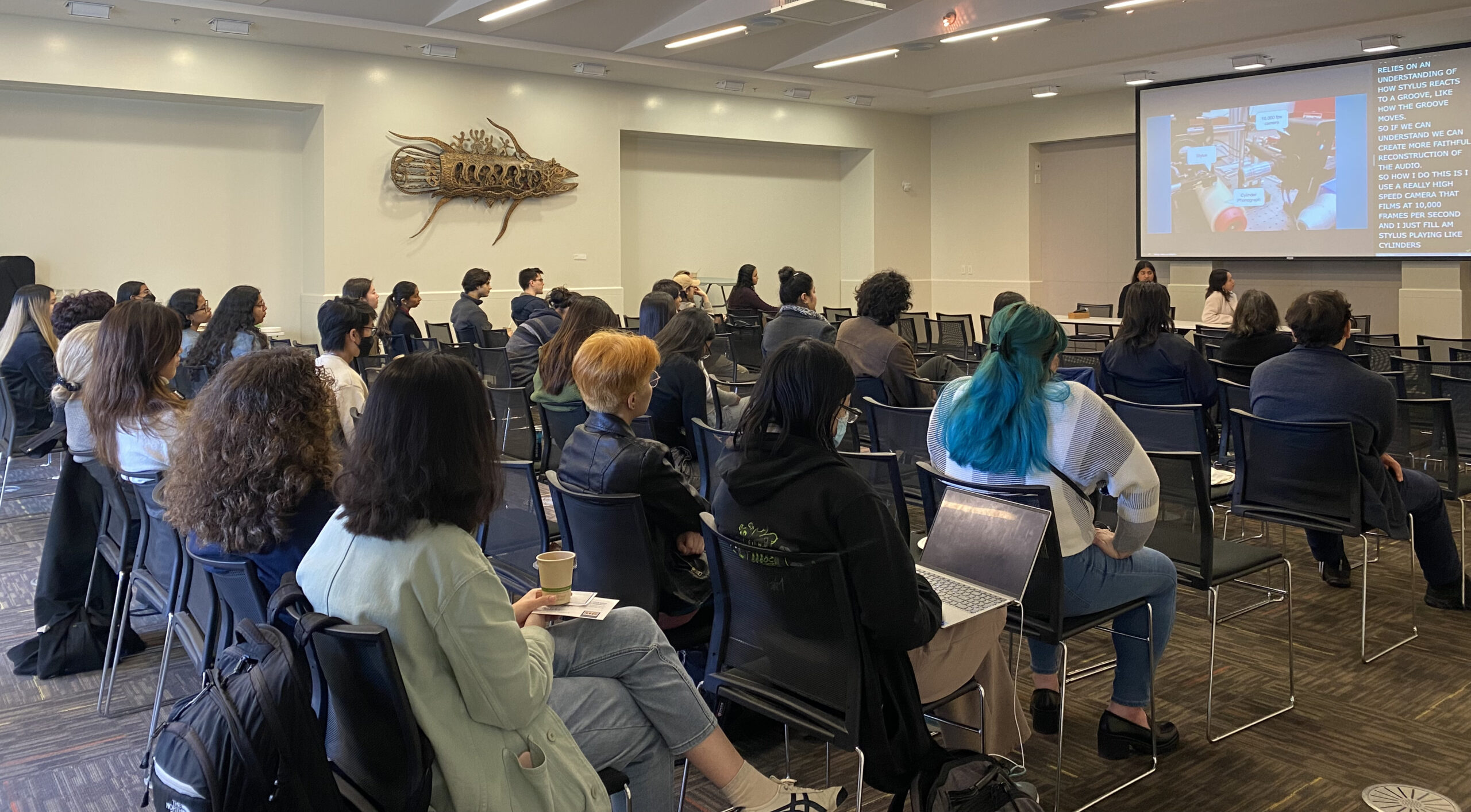
I loved how diverse the speakers were, not only in lived experiences but academic interests. I loved loved loved the interdisciplinary aspect of this symposium!
— Undergraduate student attendee
I loved the break for questions with each panelist and the open lunch, as it gave me a chance to talk with almost all who I wanted to speak with and gain valuable information.
— Undergraduate student attendee

In my earlier years as an undergraduate, I lacked the guidance for opportunities like these, and more so opportunities which support marginalized groups. Having the opportunity to network with other undergraduate students about research, resources, and funding opportunities was a real full circle moment. Events like these allow students to come together and generate a supportive and empowering environment.
— Berenise Rangel, Class of 2024 Undergraduate Student at University of California, Berkeley
Application
We invite undergraduate students to apply to present at the inaugural UC Berkeley Undergraduate Research Symposium in spring 2024. The selected students will share their research in the form of an 8-minute presentation, and hear presentations from other undergraduate students. They will also network with new students and share insights about how to get involved with research at UC Berkeley. The Symposium will be hosted at the David Brower Center on Saturday, February 24, 2024.
When you apply, you will be asked to submit the following information:
Research Project Title
Research Abstract (250 words maximum)
Name(s) of Your Research Project Mentor(s)
Eligibility: Current UC Berkeley undergraduates. Applications from all majors and colleges are welcomed. Priority will generally go to applicants from the College of Letters & Science.
Funding: $100 stipend
Deadline: November 17, 2023, at 5 PM PT
Application Form: UC Berkeley Undergraduate Research Symposium 2024 Call for Proposals
Questions
Email ours@berkeley.edu
The Undergraduate Research Symposium is co-sponsored by the College of Letters & Science and the Division of Undergraduate Education’s Berkeley Collegium Grant Program.